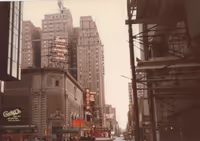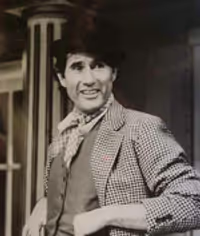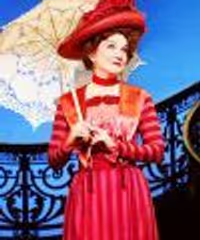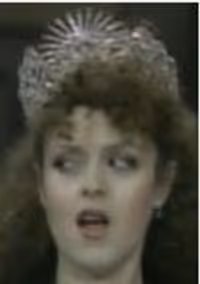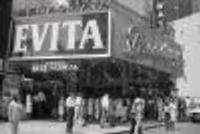Nicole Scherzinger to star in West End Sunset Boulevard at the Savoy
#200Nicole Scherzinger to star in West End Sunset Boulevard at the Savoy
Posted: 9/21/23 at 7:49pm
Curtain call video on the former bird site https://x.com/tyce/status/1704973319391306028?s=46&t=c8AYn9o3ZHkn-imSWQVGxA
#201Nicole Scherzinger to star in West End Sunset Boulevard at the Savoy
Posted: 9/21/23 at 7:51pm
18 piece orchestra and it sounded absolutely glorious. Forgot to mention that above.
#202Nicole Scherzinger to star in West End Sunset Boulevard at the Savoy
Posted: 9/21/23 at 7:54pm
IGNORE DUPLICATE POST FOLLOWING THIS.
Facebook member Daniel David re anticipation of the show:
"some of these comments. firstly, give the girl a chance. but secondly, this is a 'remained' [sic] production, always has been billed as such. we don't know context or timing of this specific shot, or how it relates to the plot. same with the costuming, we know this is Nicole's only costume as she said in an interview she only has the one costume, and its [sic] giving minimalistic, which to me at least, implies a focus on the material than the grandure [sic] like the original productions. why not embrace that?? give it a chance at least before judging."
The Scorpion
Leading Actor Joined: 1/3/07
#203Nicole Scherzinger to star in West End Sunset Boulevard at the Savoy
Posted: 9/21/23 at 7:54pm
I needed to ramble about this so here my incoherent thoughts at 1am. WARNING: there are spoilers, so I've put everything in the spoiler box below.
First thing’s first, since this is what has elicited the most comments on social media, this Norma is not fifty. She’s forty. The line has been changed. So now you know. It does create issues, though—the rest of the cast is incredibly young, and mostly fresh out of drama school with hardly any credits. Tom Francis, who plays Joe, sings superbly and has great stage presence (and I’m sure this performance will lead on to many bigger and better things for him), but, as he’s so young and fresh-faced, can you really buy him as a jaded, tired Joe Gillis who has already tried a million times to make his Hollywood career work without success?
If the audience reaction is anything to go by (mostly a standing O, with a lot of whooping and cheering), I will be in the minority when I say that I felt this was an unsuccessful production. I didn’t loathe it, but it’s not one I would want to revisit either. I suspect the critics will adore it and say that it breathes new life into the show and that they will trot out clichés such as ‘reimagined’, ‘unveils the dark heart lurking beneath the work’, ‘transforms the show into a masterpiece’ and such like. I don’t agree.
For all the talk of reimagining, there is little new or inventive here. If you have seen any of Jamie Lloyd’s recent productions then you can imagine precisely what this is going to look like and your mental images will be proved correct. Think Cyrano de Bergerac or the Regent’s Park Evita, with a young cast, T-shirts and gleaming white sneakers, and a monochrome, bare aesthetic. It’s the same here, and to be honest I’m kind of tired of it. Can he try something else? He certainly used to. I loved his Piaf and Passion from years ago. Every recent production has looked the same, and had the same disregard both for the text and for accommodating audiences unfamiliar with the work. I’m afraid the predictability of the aesthetic meant that Act 1 was a bit of a snoozefest for me dramatically, save that the orchestra (which I have to say was superb, along with the excellent sound design) meant I was immensely enjoying the music. The show is still set in its period, although that leads to multiple inconsistencies (an example is when Betty finishes ‘Blind Windows’ – which I swear in Act 1 had been called ‘Dark Windows’ like in Wilder’s film – on what appeared to be a Macbook Pro or something similar).
So you’d better know your Sunset before you see this, or you will be confused (albeit not as confused as you would have been had you not seen Evita before Lloyd’s production of it, in large part thanks to the fact that Sunset has a robust book indebted to that magnificent screenplay, whereas Evita has no book and relies on a director to fill in the gaps, which Lloyd did not do at Regent’s Park). As everyone predicted, there is no set (save for a video screen at the back that is tilted at an angle), and there are no props on stage (the aforementioned Macbook is in one of the filmed sequences). The text has been revised to accommodate this absence, as there is no ‘staircase of the palace’ and, since there is no chimp being buried either, Joe has to recite a speech about the chimp…which to me seems to betray the rule of showing rather than telling. The lack of any visuals other than the cast themselves though does mean this assumes prior knowledge of the show – for instance, I don’t know how anyone is supposed to know what is going on when Joe says ‘it looks like six very important pictures’ given the lack of physical screenplay that Norma has written. Relationships are not particularly clear either unless you know the show, as a large chunk of the show has the characters directing their lines in Brechtian fashion to those out there in the dark rather than to each other.
This production has made far more extensive changes to the score and lyrics than any other. The irritating (and frankly trashy) ‘The Lady’s Paying’ and its grating reappearance as ‘Eternal Youth’ in the second act have been exercised—neither are missed, though the spoken lines Norma delivers to explain Joe’s change of dress seem rather hastily and clumsily added. There is new underscoring to accompany it. ‘Too Much in Love to Care’ has been reworked slightly so that its climax with the kiss (for which there is a new musical build-up) happens before the end, with the song then winding down after that ( think ‘All I Ask of You’ ). ‘With One Look’ has had the keys altered again from the instrumental section onwards. This means Nicole’s version is neither the London original nor the LA version. Instead, the orchestral climax after ‘…still out there in the dark’ has had its key lowered (I didn’t like this as that is one of my favourite moments), so that Nicole can then take that key forward for a big finish without the Glenn Close-style modulation. I wasn’t convinced. There were numerous lyric changes; none of them was an improvement (save for those that had been done for the Coliseum revival). ‘Girl Meets Boy’ and its reprises were entirely rewritten so as to be no longer recognisable lyrically. Part of me wonders whether this was the solution to what was never a problem in the first place as regards the Hollywood rule of the 1950s not to have a screenplay where black people are taken to a restaurant—I don’t see why this can’t be said so as to highlight (and remind the audience of) the racism endemic in the system of the period, instead of airbrushing history to skirt around the issue. Bizarrely, ‘Let’s Have Lunch’ has reverted to its Sydmonton title, ‘Let’s Do Lunch’.
I mentioned a tilting video screen. That was another aspect that I didn’t think was novel. Basically just think of Ivo van Hove’s short-lived revival of West Side Story, with actors on stage using cameras that film video that is then shown on the screen in big, shaky close-ups (the recent revival of A Chorus Line at the Leicester Curve, which is being put on tour later this year, did the same). I have little patience with this when it is overused, and it was really overused here. So much so that entire scenes (particularly the ones with Joe and Betty) happened entirely on the screen and not in front of us (I guess the actors were backstage somewhere as they weren’t even on stage at these points, where you begin wonder what you’ve paid money to see). It added to the Brechtian alienation, so you did not invest in any of the characters’ relationships, but I begin to wonder what the point of that Verfremdungseffekt is, since there was nothing about the production that seemed to me to be trying to expose a hypocritical, rotten underbelly of a studio that churns through stars. If anything, the whole production – with its constant self-referencing, attempts to ‘sex up’ the material (to the point where Nicole’s Norma not only makes frequent and apparently parodic sex faces to the camera that are then blown up onto the video screen, but she also makes orgasm noises during the Salomé sequence), and Instagram aesthetic (not dissimilar to Lloyd’s Evita) – seemed to go in precisely the opposite direction by embracing and affirming value in what is hip today but will be passé in a decade.
The Brechtian elements were inconsistently used, though, such that I never knew whether we were within or without the narrative of the story, or in some alternate universe altogether. As the ‘Entr’acte’ played, live video was fed to the screen of Tom Francis (rather than Joe himself) leaving his dressing room, saying hello to other actors, and making his entrance. Random stuff was included that generated laughs from the audience, such as a guy in a monkey suit lounging about backstage, and David Thaxton (rather than Max) staring at images of Nicole Scherzinger in provocative poses in his dressing room. So somehow at that point we are outside of the story in self-parodic mode. Then the title song arrives and it is no longer poking fun at itself, but neither is it within the narrative either. 99% of the song is delivered from outside the theatre, with Joe (or rather Tom Francis) singing it as he does a walkabout of the immediate vicinity of the theatre and pointing at posters of the show, only to arrive in the auditorium to deliver the final notes. The audience went wild, but surely this is simply due to novelty factor (and it’s not novel in the sense that this has been done in other contexts, like the Oscars). But singing a song on the streets of London does not evoke the LA Joe is talking about, and the effect simply distracts the audience from what are quite crucial points he is making in his song about the nature of Hollywood and why he has decided to sell out. And again, if I’m in the theatre, I’d rather have the performers in front of me in the same room rather than somewhere else entirely.
That doesn’t mean there weren’t any highlights or inventive parts for me. I did really rate how Joe’s death was staged. It’s not clear what the weapon was (given the lack of props), but we were plunged into darkness and loud noises succeeded each other in syncopation with ‘white outs’ from the lighting, almost out of a horror film. Norma and Joe then appear bloodied at the end (and in the curtain call). It was effective. I also rather liked having Cecile B DeMille as a shadowy, silhouetted figure (think of some of the shadow effects in Citizen Kane that were appropriated by Hal Prince in Evita) who appears only on the video screen. The shadow looms over Scherzinger’s Norma, suggesting her powerlessness and insignificance in relation to the monolithic and faceless studio system.
Some staging choices were a little excessive and added nothing, such as having ghosts of Norma (à la Follies) appearing at various moments. This was most distracting when they then performed bizarre choreography during the final sequence.
If the standout performer was Tom Francis as Joe, this was for his stage presence and voice. As I said, I think he’s a little young to be Joe Gillis and he will make a better one in ten years’ time. Nicole’s Norma didn’t really exist until Act 2. Act 1 was Nicole playing herself, or some kind of caricature of herself or the Pussycat Dolls. There was no engagement with the text and no attempt to portray a faded star of silent screen. I therefore assumed we were going to have a Norma-less Sunset, but suddenly Norma did unexpectedly appear in Act 2, if weakly. There was an attempt to channel Norma Desmond, rather than Nicole Scherzinger, in ‘As If We’d Never Said Goodbye’ and in the descent into madness. But by then it was too late to really buy it. The vocals were fine, if a little overpoppy at time, but her rendition of spoken lines was completely out of character and sounded more Valley Girl than anything else. David Thaxton was surprisingly muted as Max but I suspect he had a bad night, and strangely he seemed to be vocally struggling when it camed to Max’s high notes in ‘The Greatest Star of All’. I do rate him, so I can only assume it was an off night for him. The rest of the cast were forgettable and there were no portrayals of any characters as such. This production is about its aesthetic and its surfaces only. Which is why I find it self-contradictory. On the one hand, it wants to distance us from both the level of the narrative and from identifying or empathising with any characters, yet, on the other, it is not doing this in the service of intellectual engagement, since its superficiality simply mirrors, rather than exposes, that of Hollywood.
All that said, if you simply want to hear this score played very well by a first-rate orchestra with crisp sound design, then you should go (and consider closing your eyes). While it was "only" 18 players, it sounded almost as lush to my ears as the 50-piece in the Coliseum revival, and better than at the Adelphi (and certainly far superior to the unrehearsed 28-piece orchestra that totally messed up the score at Alexandra Palace not so long ago).
Updated On: 9/21/23 at 07:54 PM
#204Nicole Scherzinger to star in West End Sunset Boulevard at the Savoy
Posted: 9/21/23 at 7:55pm
Facebook member Daniel David re anticipation of the show:
"some of these comments. firstly, give the girl a chance. but secondly, this is a 'remained' [sic] production, always has been billed as such. we don't know context or timing of this specific shot, or how it relates to the plot. same with the costuming, we know this is Nicole's only costume as she said in an interview she only has the one costume, and its [sic] giving minimalistic, which to me at least, implies a focus on the material than the grandure [sic] like the original productions. why not embrace that?? give it a chance at least before judging."
#205Nicole Scherzinger to star in West End Sunset Boulevard at the Savoy
Posted: 9/21/23 at 8:09pm
TaffyDavenport said: "I'm kind of a Sunset purist, but Jordan's "people are gonna hate this" comment has me curious to witness it for myself, and I'd love for a limited run at BAM or similar to make its way over here. I know ALW's ego might prohibit Off-Broadway, but who ever thought he'd collaborate with Jamie Lloyd?"
Obviously this was never aimed to purists.
The moment Lloyd was hired any hopes of a traditional staging went out the window.
#206Nicole Scherzinger to star in West End Sunset Boulevard at the Savoy
Posted: 9/21/23 at 8:13pm
Exactly. Which is why I threw any and all expectations out and walked in tonight expecting something strange and completely new. I think if you know/love this show and want to have any sort of enjoyment watching it, that's what you need to do with this one.
#207Nicole Scherzinger to star in West End Sunset Boulevard at the Savoy
Posted: 9/21/23 at 8:14pm
blaxx said: "TaffyDavenport said: "I'm kind of a Sunset purist, but Jordan's "people are gonna hate this" comment has me curious to witness it for myself, and I'd love for a limited run at BAM or similar to make its way over here. I know ALW's ego might prohibit Off-Broadway, but who ever thought he'd collaborate with Jamie Lloyd?"
Obviously this was never aimed to purists.
The moment Lloyd was hired any hopes of a traditional staging went out the window."
I'm not an idiot. Obviously, I knew it was going to be a non-traditional production, and that wasn't the point I was making. JFC.
#208Nicole Scherzinger to star in West End Sunset Boulevard at the Savoy
Posted: 9/21/23 at 8:19pm
Jordan Catalano said: "Exactly. Which is why I threw any and all expectations out and walked in tonight expecting something strange and completely new. I think if you know/love this show and want to have any sort of enjoyment watching it, that's what you need to do with this one."
All moi can add is ... "Not Since Carrie"
pmensky
Broadway Star Joined: 7/18/11
#209Nicole Scherzinger to star in West End Sunset Boulevard at the Savoy
Posted: 9/21/23 at 8:39pm
It’s really dumb that they didn’t age 45-year-old Scherzinger up five instead of down five years, and kept the timeline of the story consistent with the real life timeline that it follows and references.
#210Nicole Scherzinger to star in West End Sunset Boulevard at the Savoy
Posted: 9/21/23 at 8:47pm
If Lloyd was going for a “women over 40 are over the hill in Hollywood” narrative by doing that, it was unsuccessful and just lost on anyone who didn’t know the line was changed.
pmensky
Broadway Star Joined: 7/18/11
#211Nicole Scherzinger to star in West End Sunset Boulevard at the Savoy
Posted: 9/21/23 at 8:59pm
Jordan Catalano said: "If Lloyd was going for a “women over 40 are over the hill in Hollywood” narrative by doing that, it was unsuccessful and just lost on anyone who didn’t know the line was changed."
I’m curious if they cut all the historic references out to justify her age change? Did they mention Samson and Delilah? Are there actors in the Playbill listed as playing the roles of Hedy Lamarr and Victor Mature? Did DeMille reference the Lindberg landing?
#212Nicole Scherzinger to star in West End Sunset Boulevard at the Savoy
Posted: 9/21/23 at 9:31pm
Just heard a clip of Scherzinger singing "As If We Never Said Goodbye" on TikTok. She sounds beautiful and did a great job, but I still prefer Patti's version of this song. Sorry, not sorry. Now, the orchestra in this production sounds magnificent from the clips I've heard. Even though it's a smaller orchestra (18 if I'm correct), it surely sounds like a full 40-piece orchestra.
#213Nicole Scherzinger to star in West End Sunset Boulevard at the Savoy
Posted: 9/21/23 at 10:24pm
I've never doubted her vocals. The woman is very talented.
But here's my concern, and it's the same one that I had after seeing Oklahoma or even Doyle's Sweeney.... what's the point of doing all this if you aren't serving the story? Like, is this production/style only for those who know the story? Like, is it conveyed that she goes to the studio thinking it's about her, but it's actually about the car? Like does that come across if there's no car? Like I feel like I walked out of Oklahoma wanted to see a traditional version because I don't think I learned the story, same with Sweeney. So then what's the point? You aren't telling the story correctly so therefore you're just being artsy to be artsy?
#214Nicole Scherzinger to star in West End Sunset Boulevard at the Savoy
Posted: 9/21/23 at 10:26pm
Dylan Smith4 said: "Even though it's a smaller orchestra (18 if I'm correct), it surely sounds like a full 40-piece orchestra. "
Sophisticated keyboard technology and good sound design can do wonders.
For those wondering about the orchestration I got the following from a photo:
3 violin
1 viola
1 cello
2 reed
1 trumpet
1 trombone
2 horns
1 guitar
1 bass
1 percussion
3 keyboards
Alessio2
Broadway Star Joined: 11/15/13
#215Nicole Scherzinger to star in West End Sunset Boulevard at the Savoy
Posted: 9/21/23 at 10:34pm
I saw this tonight and I have so many thoughts and I will write more later, but I absolutely loved this production. I will start by saying this is my favorite musical and score and I was not disappointed. I have so many thoughts on this. There were a few things that didn't work for me, but overall I was floored and what worked was so incredibly effective.
I sat DIRECTLY behind ALW and that was also very special for me. Got to chat with him very very briefly after the show and he was very kind to myself and my husband.
The orchestra sounded absolutely incredible, so full and lush and really filled the theater. I noticed a few lyric changes and also they cut out The Lady's Paying....can anyone chime in and let me know if anything else was cut??
The finale was stunning and I was generally very impressed with Nicole's acting. I knew she would sing it well but wondered about her acting. There are a few strange choices but when she was good she was great.
If you are a fan of this show, go see it with an open mind and heart! It's very conceptual, weird, bizarre, dark, and out there and I loved it!
#216Nicole Scherzinger to star in West End Sunset Boulevard at the Savoy
Posted: 9/21/23 at 11:35pm
Can someone who saw it explain the blood? Maybe spoiler toggle. The story typically starts with Joe’s body in the pool after being shot…so how does all the blood factor in?
#217Nicole Scherzinger to star in West End Sunset Boulevard at the Savoy
Posted: 9/22/23 at 3:45am
It is a hugely engrossing, self-ironic, fast-paced production in which the whole is better than the sum of its parts.
As the overture starts playing, Young Norma, who has been standing behind the curtain for a good ten minutes, does a little interpretative dance. The stage is bare, except for Nicole sitting at the back of the stage with her back to the audience, and a body bag in the middle. As the music goes on Joe opens and crawls out of the body bag. The whole "Let's Have Lunch" sequence is staged with characters coming on front stage, delivering their lines, and moving back: it's a very young cast, modernly dressed in black and white and looking like a zara advert. During the car chase, Joe holds a wheel-cum-camera as he sits in front stage while his face is projected on the LED screen and credits start appearing on it too, culminating with the title/logo as the Sunset Boulevard motif starts playing.
Nicole looks like a star, and she's never more regal than when she stands there doing nothing. Her voice is brilliant, and the acting is very Real Housewifes of Beverly Hills. A lot of fingers snapping, hair flipping, and looking into the camera as if she were in The Office. Eg, when Joe warns her that he is very expensive she replies something like "Don't worry about money, HON–EYYY". Some lines are delivered directly into the camera and she got a lot of laughs, not sure if they were intentional. When Joe suggests that the audience doesn't want to see her in every scene of Salome, she replies "Of course they do" and then to the camera “What else would they have come for?” *wink wink*
You couldn't drop her in Trevor Nunn's production and expect her to be great, but it's a performance that works in this context, although you never get the sense that she used to be a movie star. She acts and talks like every woman in reality tv shows, and even when a more organic character emerges as act two goes on, I think we never really come to appreciate she used to be a Hollywood star – let alone wonder why someone looking so young and sexy and acting like everyone in showbusiness is not working in showbusiness anymore. "Nothing's wrong with being forty" (the line has been updated) "unless you're acting twenty" etc etc
The only bit that really doesn't work – imo – is Salome, in which she does a whole püssycat routine with even the split and sultrily rolling around the stage with spread legs like Velma in All That Jazz. It's a performance that works because it builds on NS' persona and career, I'd be curious to see if Rachel Tucker is directed to do the same or has a different approach, because some of the lines make sense only if NS delivers her. Young Norma is quite charming, works better than the Lonny Price's version of a few years ago, although she is not fully necessary.
I liked the use of the screen and the way the conversations at Paramount – Sheldrake telling Max they want the car, Joe meeting Betty again, Max telling Joe the truth – only appear on screen, while Norma remains center stage. She never leaves the stage for the whole of act 2. DeMille never appears, his face is just a gigantic silhouette on the screen, and it works.
Jamie Lloyd makes a lot of bold choices, and most of them work. The entr'acte and title song, as discussed, is entirely done on screen, starting with Joe chilling in his dressing room and watching the scene in which Gloria Swanson engulfs William Holden in her arms (the equivalent of act 1 ending) before meeting his fellow cast members as he walks through the backstage and sings the title song while he exits the stage door, goes around the block, enters the Savoy, goes down the endless stairs and finally enters the stalls and climbs on stage for the final note. It's trashy, it's gimmicky, I loved it, it was fantastic, and the audience ate it up. Biggest ovation till curtain call, got a full standing ovation, unlike "As If We Never Said Goodbye", which was partial.
Again, a lot of the choices sound ridiculous when described (and even when you see them), but most of them actually work. In the whole orchestral section between "The Phone Call" and Betty's arrival at the house Max, Joe and Norma run endlessly around the stage. When Joe tells Betty "That's Norma Desmond, That's Norma Desmond, That's Norma Desmon" the whole cast appears on stage, dressed in NS' black négligée. As the confrontation between Joe and Betty climaxes, all characters start running in a circle. Again, makes no sense, but it's fantastic. I think it kinda works only if you're willing to buy into it. I was ironically puzzled for most of act 1, but really engrossed in act 2.
For some reasons, they really try to make you feel for Artie, which is odd because I doubt anyone has ever spent a single thought on him. He dramatically walks around the stage as Joe and Betty sing Too Much in Love To Care. When they kiss, the huge LED screen on the back – think about the mirror in A Chorus Line or the original production of Cabaret – shows a close-up of Artie with a single tear rolling down his cheek. You can't make stuff like this up.
The script and score have been trimmed, although it's not always done consistently. In the "Salome" reprise in the final scene, Norma says "Mad about the boy", but it makes no sense since she never presented Joe with the cigarette case before The Perfect Year – in which she really does tango.
David Thaxton is usually brilliant at making boring characters shine (eg Giorgio in Passion), but he's not quite there yet, it was a lot of looking dour into the camera and not much else, but he's a fantastic actor and I'm surely he'll be great eventually.
Tom Francis is great. He looks and acts a bit like Jeremy Allen White, wonderful voice, and charismatic stage presence. He is a bit young to be so disillusioned, but again everyone in the cast is too young. Grace Hodgett Young is a very good Betty too.
The orchestra is wonderful and it's very well sung.
It's not quite camp, but it has a minimalist sort of camp that makes it work. The purists will hate it – which is very fair, it's doesn't always work, and NS is not a Norma Desmond (or rather, she's a Norma Desmond for the ig reels generation – but I had a blast.
#218Nicole Scherzinger to star in West End Sunset Boulevard at the Savoy
Posted: 9/22/23 at 3:51am
God I can't wait to see this now. I'm really interested to hear the changes to the score/tone and wonder if they've been able to shake off that kind of icky ALW cringe camp feeling (sorry) associated with a traditional staging. I loved the Oklahoma revival and I loved Jamie Lloyd's Evita. I feel like maybe this is for me.
#219Nicole Scherzinger to star in West End Sunset Boulevard at the Savoy
Posted: 9/22/23 at 7:40am
imeldasturn - what a glorious well described assessment/review. This production is exactly what I was hoping and expecting. I love the deconstruction of traditional work, even if some things don’t work. It’s so refreshing seeing different interpretations and yes, anyone can restage the traditional versions whenever they well damn please.
So would LOVE to see someone try this with A CHORUS LINE. Would even LOVE to see the deconstructed version of GYPSY that Sam Mendes originally intended for his 2003 Broadway revival before Arthur Laurents put his foot down (again) and revisions had to be done, which disappointed the cast who signed on based on the original Mendes adaptation.
OhHiii
Broadway Legend Joined: 4/30/16
#220Nicole Scherzinger to star in West End Sunset Boulevard at the Savoy
Posted: 9/22/23 at 8:50am
Count me among those who desperately want a deconstructed take on Gypsy. The material is ripe for it.
Seeing the reactions to this across the former bird app and on here makes me wonder if there’s been a production in recent history (since Fish’s Oklahoma I guess) that’s caused such a reaction. There is BUZZ on this which, I think if you’d have said that 5 years ago a production of sunset boulevard with Nicole Scherzinger of all people leading would elicit such excitement, people would have laughed in your face. That people are more intrigued to see it even while not being a fan of productions like this is a testament to how novel this seems to be.
#221Nicole Scherzinger to star in West End Sunset Boulevard at the Savoy
Posted: 9/22/23 at 9:13am
Betty Buckley is supportive of this new adaptation and plans on seeing it. ![]()
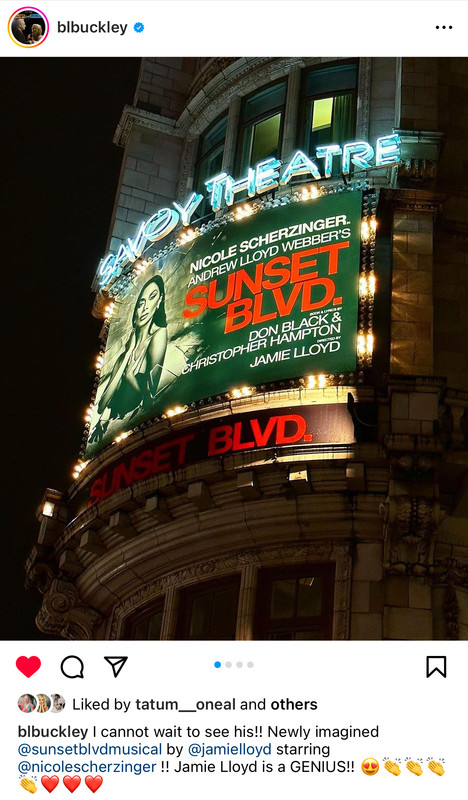
JasonC3
Broadway Legend Joined: 4/22/21
#222Nicole Scherzinger to star in West End Sunset Boulevard at the Savoy
Posted: 9/22/23 at 9:16am
OhHiii said: "Seeing the reactions to this across the former bird app and on here makes me wonder if there’s been a production in recent history (since Fish’s Oklahoma I guess) that’s caused such a reaction. There is BUZZ on this which, I think if you’d have said that 5 years ago a production of sunset boulevard with Nicole Scherzinger of all people leading would elicit such excitement, people would have laughed in your face. That people are more intrigued to see it even while not being a fan of productions like this is a testament to how novel this seems to be."
I don't disagree with any of this, but for the moment, I'm remembering this is first preview buzz, something which just about any reasonably anticipated show will generate among theater fans. ALW probably draws a bit more than other composers as so shows with "diva" moments and storied pasts like Sunset. I'm curious as to what the word of mouth will be around the production in about two weeks after more people have seen it and commented on it.
OhHiii
Broadway Legend Joined: 4/30/16
#223Nicole Scherzinger to star in West End Sunset Boulevard at the Savoy
Posted: 9/22/23 at 11:55am
Noted this in another thread, but thinking about the possibility of a Broadway transfer, I honestly think it may be more likely than not. Come to that conclusion given a few factors, ALW's ego, his recent embarrassing Broadway failure, and the potential of this production to be critic-bait. It's not hard to imagine he's desperate to right the ship of his reputation on Broadway soon after Bad Cinderella gave him some of the worst reviews of his career. Which, famously, he's very sensitive to.
#224Nicole Scherzinger to star in West End Sunset Boulevard at the Savoy
Posted: 9/22/23 at 12:03pm
OMG - This looks intriguing. Right up my alley!
Videos






